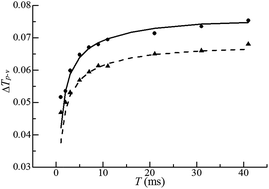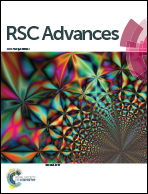Ultrashort-laser-pulse-induced thermal lensing effect in pure H2O and a NaCl–H2O solution†
Abstract
Using the Z-scan technique with 82 MHz 18 femtosecond (fs) laser pulses at 820 nm, we explore the thermal lensing effect induced in pure H2O and a NaCl–H2O solution. We verify that linear absorption dominates over both two-photon absorption and stimulated light scattering (SLS) in heating of pure H2O. This differs from the situation wherein SLS dominates heating of CS2. In addition, when dissolution of NaCl into H2O at a concentration of 1 M incorporates thermal and mass diffusions into the mechanisms of the thermal lensing effect, we find that this effect is enhanced and thus determine that the sign of the Soret coefficient of NaCl is positive. Notably, use of 820 nm 18 fs laser pulses in this study, in contrast to visible continuous light commonly used in the thermal diffusion forced Rayleigh scattering technique embedded with the optical heterodyne detection scheme, eliminates the need to add inert dyes into NaCl–H2O to enhance the absorption. This avoids the artefact caused by the dyes.


 Please wait while we load your content...
Please wait while we load your content...